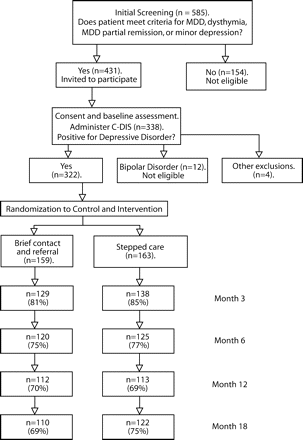Treatment for cigarette smoking among depressed mental health outpatients: a randomized clinical trial
- PMID: 17008577
- PMCID: PMC1586139
- DOI: 10.2105/AJPH.2005.080382
Treatment for cigarette smoking among depressed mental health outpatients: a randomized clinical trial
Abstract
Objectives: Using a brief contact control, we tested the efficacy of a staged care intervention to reduce cigarette smoking among psychiatric patients in outpatient treatment for depression.
Methods: We conducted a randomized clinical trial that included assessments at baseline and at months 3, 6, 12, and 18. Three hundred twenty-two patients in mental health outpatient treatment who were diagnosed with depression and smoked > or =1 cigarette per day participated. The desire to quit smoking was not a prerequisite for participation. Staged care intervention participants received computerized motivational feedback at baseline and at 3, 6, and 12 months and were offered a 6-session psychological counseling and pharmacological cessation treatment program. Brief contact control participants received a self-help guide and referral list of local smoking-treatment providers.
Results: As we hypothesized, abstinence rates among staged care intervention participants exceeded those of brief contact control participants at months 12 and 18. Significant differences favoring staged care intervention also were found in occurrence of a quit attempt and stringency of abstinence goal.
Conclusion: The data suggest that individuals in psychiatric treatment for depression can be aided in quitting smoking through use of staged care interventions and that smoking cessation interventions used in the general population can be implemented in psychiatric outpatient settings.
Figures



References
-
- Himelhoch S, Daumit G. To whom do psychiatrists offer smoking-cessation counseling? Am J Psychiatry. 2003;160:2228–2230. - PubMed
-
- Hughes JR Treating nicotine dependence in mental health settings. J Pract Psychiatry Behav Health. 1997;July:250–254.
-
- Covey LS, Glassman AH, Stetner F. Major depression following smoking cessation. Am J Psychiatry. 1997;154:263–265. - PubMed
-
- Lasser K, Boyd JW, Woolhandler S, Himmelstein DU, McCormick D, Bor DH. Smoking and mental illness: A population-based prevalence study. JAMA. 2000;284:2606–10. - PubMed
-
- Hasin DS, Hatzenbueler M, Smith S, Grant BF. Co-occurring DSM-IV drug abuse in DSM-IV drug dependence: Results from the National Epidemiologic Survey on Alcohol and Related Conditions. Drug Alcohol Depend. 2005;80:117–23. - PubMed
Publication types
MeSH terms
Grants and funding
LinkOut - more resources
Full Text Sources
Medical
Research Materials

